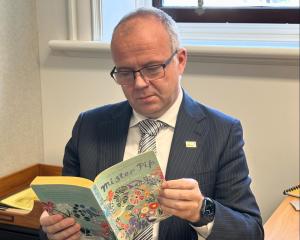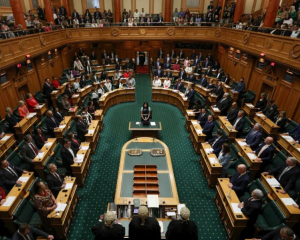The commission last week banned the satirical song Planet Key from television and radio broadcasts, and cautioned against a billboard for a rugby game which parodied National's election hoardings.
Now it has taken aim at an exhibition showcasing the late Labour MP Whetu Tirikatene-Sullivan's wardrobe because the opening is due to fall on election day.
The Hawke's Bay Museums Trust has moved the opening to the following weekend after the Electoral Commission advised any reference to the Labour Party would have to be removed on September 20.
Otago University politics lecturer Bryce Edwards said the commission was making the correct interpretation of the law.
"And if we have any complaints about these issues, we should be focussing on shortcomings in the law, or having a debate about the intention of the law and what we want."
However, Otago University public law expert Professor Andrew Geddis said the commission was "very risk averse" and tended to be cautious and conservative in its advice.
The commission did not want to get it wrong and end up with someone being "hauled into court" and found criminally liable of an electoral offence, he said.
Its advice was not legally binding and people could still go against it.
"But of course the problem is, if you go against the commission's advice, they may then report you to the police, and then all of a sudden you find yourself being investigated."
The issue stems in part from the wording of the Electoral Act, which has strict rules about election advertising, but does not define what an advertisement is.
Dr Geddis said he did not believe the Planet Key song was an advertisement. However, the Northland Rugby Union billboard was clearly an advertisement because it looked like it was promoting a political party, even though it wasn't.
The effect of an advertisement had nothing to do with the intentions of the advertiser, but what a reasonable person would think of it, Dr Geddis said.
The Tirikatene-Sullivan exhibition got into difficulty because there were special rules relating to election day which were much wider in scope.
The Electoral Act prohibits the display of party names, emblems, slogans or logos on election day between midnight and 7pm.
It also prohibits the display or exhibition of material that is likely to influence how electors should or should not vote.
Electoral Commission spokeswoman Anastasia Turnbull said the songwriter and exhibitor had approached the commission for advice, while the billboard had received a number of complaints.
The Tirikatene-Sullivan exhibit was understood to feature photographs of her life and work, some of which may have included old versions of the Labour Party logo.
Ms Turnbull said it could be open to the public on election day, but the commission had advised organisers to be careful not to display any party logos or anything else that might be perceived as political or associated with a particular party.
The commission said the Planet Key song -- considering its content and the context in which it was published -- was an election advertisement for the purposes of the Electoral Act.
An election advertisement was an ad in any medium which could be regarded as "encouraging or persuading voters to vote, or not to vote for a candidate or party or type of candidate or party".
Ms Turnbull said the commission had received a number of complaints about the Northland Rugby Union signage.
"The organisation concerned took remedial action promptly, and no further action is being considered."
She said the number of requests for advice, enquiries and complaints the commission had received would be available after the election.
APNZ mb gf











